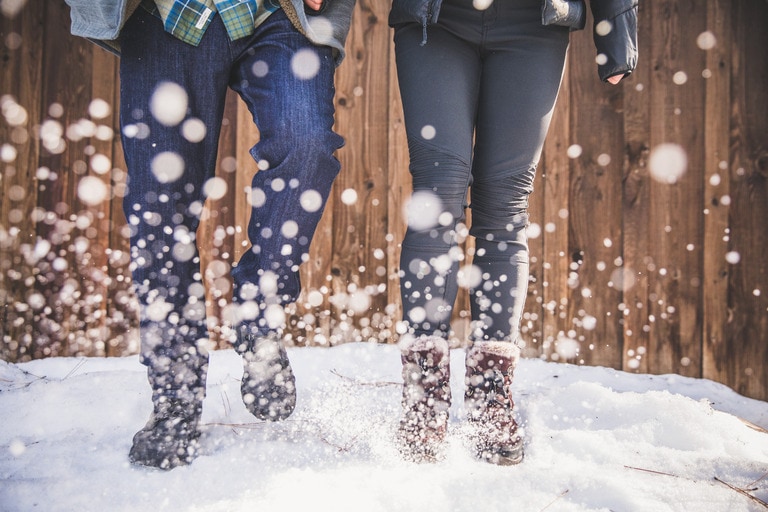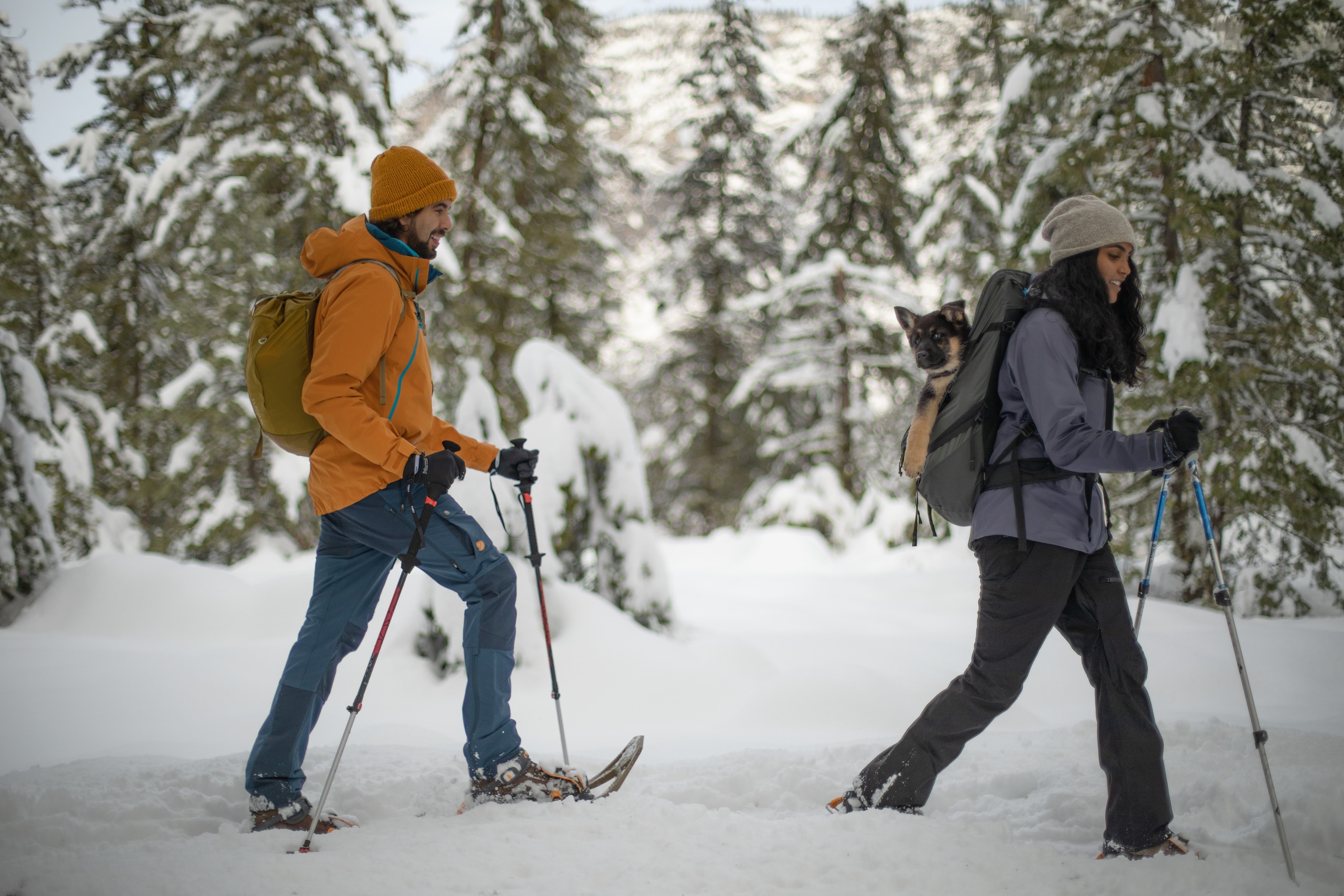Snow, ice and downright freezing rain are just a few of the delightful hazards that Mother Nature throws our way during winter. These chilly conditions can make any outdoor adventure a slog—but not if you have the right gear. The winter boots assembled here are proof that proper footwear can transform a frigid arctic day into a delightful romp through Jack Frost’s finest.
Over the years, footwear technology has evolved so we can have it all: lightweight warmth, waterproofing, traction, style and even—gasp!—reasonable price tags. Choosing the right kicks may feel daunting with all of the available options, so we’ve asked REI staffers, members and customers to share their favorite footwear for facing the frigid weather. Here are their seven top picks for winter footwear currently available at REI Co-op. Whether you’re headed to the grocery store or climbing a local peak, we’ve got something for your feet in the fourth season.
The 7 Best Winter Boots of 2025: Staff Picks
For quick recommendations, check out the list below—or scroll down for detailed reviews.
- Best Overall Winter Boots for Men: The North Face Chilkat V 400 Waterproof Boots – Men’s
- Best Overall Winter Boots for Women: Sorel Tivoli V Waterproof Boots – Women’s
- Best Winter Boots for Kids: Columbia Bugaboot Celsius – Kids’
- Best Winter Boots for Mild Winter Weather: Merrell Thermo Chill 2 Mid Waterproof Hiking Boots
- Best Winter Boots for Heavy Winter Weather: FUBUKI Niseko 3.0 Boots
- Best Boots for Winter Hiking and Backpacking: Salomon X Ultra Snowpilot Waterproof Hiking Boots
- Best Ankle Winter Boots: The North Face ThermoBall Lace Up Waterproof Boots – Women’s
Editor's note: We updated this guide on October 13, 2025, to include the FUBUKI Niseko 3.0 Boots as our pick for heavy and harsh winter weather.
Best Overall Winter Boots for Men
The North Face Chilkat V 400 Waterproof Boots - Men's
Waterproof Yes
Upper Full-grain leather and suede
Insulation 400 g Heatkseeker Eco
Weight (pair) 3 lbs. 2 oz.
The Chilkat V 400 from The North Face checks the major boxes: warm and cozy, plenty of ankle support and a fun style that fits in on those après days. These boots feature a proprietary insulation that’s both warm and lightweight, so they don’t feel like clunkers on your feet when tromping on the trails. “If I had to walk miles in the snow, I’m glad I have these boots on my feet,” said one REI customer-reviewer. “I want more snow!”
Rubber outsoles and moderate tread depth mean you’ll get where you need to go without slipping on slick terrain. “The grip is 100,” said a customer-reviewer. Unlike other boots constructed with synthetic materials, the entire upper is made from full-grain waterproof leather and suede—both materials that boast natural water resistance before treatment. And, with a cuff that rises about 5 inches above your ankle, protection against the elements is practically guaranteed. Fit note: The Chilkats run small; consider buying a full size up. Also available in women’s. Buy here.
Best Overall Winter Boots for Women
Sorel Tivoli V Waterproof Boots - Women's
Waterproof Yes
Upper Suede/leather/canvas/faux fur
Insulation 200 g polyester
Weight (pair) 2 lbs. 12.8 oz.
The Tivoli V is the latest iteration of a time-tested Sorel boot that’s been around since 2011. The updated V (or fifth) Tivoli offers even more warmth than the last, thanks to an additional 100 grams of polyester insulation. The microfleece lining and faux-fur ankle collar add bonus heat and coziness with a bit of flair, ensuring these kicks will look good while grocery shopping or grabbing a post-ski snack. Thankfully, all that comfort doesn’t come with a weight penalty. The Tivolis aren’t bulky or cumbersome—you get a cozy fit with a streamlined design. (Though many suggest sizing up a full size to accommodate heavier socks.)
Of course, warmth and comfort won’t get you anywhere if the boots don’t stand the test of time. Thankfully, the Tivoli V are built like tanks with plenty of durability for the long haul. The waterproof suede uppers combine with leather mudguards and heel overlays to provide extra longevity when you’re bashing around on the trails. The rubber outsoles stick to the iciest of terrain, so you can focus on your priority: adventuring. Buy here.
Best Winter Boots for Kids
Columbia Bugaboot Celsius Boots - Kids'
Waterproof Yes
Upper Leather/textile
Insulation 400 g
Weight (pair) 1 lb. 14.4 oz.
Children have two switches: on and off. Flip that power on with the Bugaboot Celcius boots from Columbia, cold-weather-ready kicks that boast 400 grams of insulation—tied for the most in any boot on this list. Combined with proprietary Columbia Sportswear Omni-Heat™ reflective lining—an interior metallic layer that bounces your body heat back at you—these boots will keep kids moving all day long.
Columbia thought through the details and created a boot that works for our littlest adventurers—and that they actually want to wear. First, they ditched the laces in favor of a bungee-enclosure system that even the youngest can manage while wearing mittens. The over-the-ankle height reaches far enough up the leg so even the deepest snow won’t creep in and ruin a perfectly good powder day. And, of course, they’re waterproof (but breathable) thanks to Columbia’s Omni-Tech™ technology. With all of that sorted, parents can focus on finding the fastest sled. Buy here.
Best Winter Boots for Mild Winter Weather
Merrell Thermo Chill 2 Mid Waterproof Boots
Waterproof Yes
Upper Mesh and polyurethane-coated suede
Insulation 200 g
Weight (pair) 1 lb. 11.49 oz. (women’s), 2 lbs. 1.84 oz. (men's)
Entry-level adventurers looking for moderate warmth at an affordable price will appreciate the Merrell Thermo Chill 2 Mid waterproof boots’ out-of-the-box comfort. Thanks to 200 grams of proprietary synthetic insulation, these over-ankle kicks keep toes toasty in temps above freezing or when you’re busting your rump during a high-cardio day outdoors. Fleece collars and 100% fleece lining are like a warm hug around hardworking feet, and provide padding and structure for longer or tougher treks. A combined leather-and-mesh upper offers fantastic durability and easily molds to the foot, and toe caps offer extra protection on rocky or scrappy surfaces, and the PFAS-free waterproof membrane keeps snowmelt and rain out while letting sweat evaporate for all-day adventures.
Note that while the EVA midsole feels plush, it won't support heavier backpacking loads. If you’re hauling gear, opt for the Oboz Bridger or Salomon X Ultra Snowpilot instead. Buy women’s. Buy men’s.
Best for Heavy Winter Weather
FUBUKI Niseko 3.0 Boots
Waterproof Yes
Upper 100% EVA (shell), 100% polyester (collar)
Insulation 50% wool, 50% polyester
Weight (pair) 3 lbs. 8 oz. (women’s), 4 lbs. 3.2 oz. (men’s)
The workhorse Niseko 3.0 boots from FUBUKI keep feet dry, warm and ready for whatever winter throws your way, from gnarly and bitterly cold conditions to snowy sidewalks or slushy parking lots. Inspired by the boots worn by northern Japanese fishers and road workers in some of the harshest winter conditions, the Niseko 3.0 features a tough, lightweight and water-resistant EVA outer shell, plus a half wool, half polyester lining that retains warmth in temps down to -5°F. They are available in higher-cut and lower-cut versions; opt for the taller boot if you live or adventure in snowy environs.
Slip them on, cinch them up and go, it’s as easy as that. The boots’ 2-layer removable insoles let you fine-tune comfort, while synthetic rubber soles block splashes, salt and slush. Available in ankle and knee-high versions, they blend function with style. One Wisconsin customer-reviewer says their Niseko 3.0 are “the warmest boots ever” along with being lightweight, comfortable and easy to clean with a magic eraser. A customer-reviewer in Alaska says that the boots are a perfect match for his wide feet, “fitting closely but not having any pressure points for my large bunions,” and while he finds it easy to get in and out of them with a single sock layer, it can be hard to get out of the boot if you double up. Consider sizing up slightly for the higher-cut version. Buy women’s high version. Buy women’s low version. Buy men’s high version. Buy men’s low version.
Best Boots for Winter Hiking and Backpacking
Salomon X Ultra Snowpilot Waterproof Hiking Boots
Waterproof Yes
Upper Polyurethane-coated leather/textile
Insulation adv.WARM polyester
Weight (pair) 1 lb. 11.9 oz. (women’s), 2 lbs. 1 oz. (men’s)
For the backpack-haulers, sled-pullers, snow-trudgers and child-toters among us: Direct your attention to the X Ultra Snowpilot from Salomon. While still burly and rugged enough to tackle the worst winter terrain, the Snowpilot is a comparative featherweight against beefier boots like the Oboz Bridger. That’s because Salomon uses a PU-coated leather and textile upper (much lighter than leather or suede) along with the brand’s proprietary 70% recycled polyester insulation. The Snowpilots won’t be as warm as the Bridgers, but you won’t need the extra heat when you’re hauling loads. Three-layer, nonfluorinated adv.DRY waterproof laminate keeps the wet stuff on the outside.
Highly aggressive lugs grip into icy and wet terrain, virtually ensuring you stay upright and mobile. And, Salomon’s “Advanced Chassis”—a structural frame embedded in the outsole—protects your foot while also providing lateral stability on uneven ground. Bottom line: You’ll practically be running up those snowy trails. Buy women’s. Buy men’s.
Best Ankle Winter Boots
The North Face ThermoBall Lace Up Waterproof Boots - Women's
Waterproof Yes
Upper Textile
Insulation ThermoBall™ Eco Insulation
Weight (pair) 12.7 oz.
There’s a lot to love with these ThermoBall Lace Up Waterproof boots from The North Face. Smartly cut just above the ankle, the recycled PET (recycled plastic bottles and other postconsumer plastic packaging) upper is rugged but the fleece collar linings make them fit like a cozy pillow. And, they’re packed with the brand’s proprietary ThermoBall™ Eco insulation, so you’ll be plenty warm. “I ordered a pair of these in December, right before the Christmas Freeze hit the Midwest,” said one customer-reviewer in Wisconsin. “They were perfect; they kept my feet toasty warm on a walk with temps in the single digits.”
The ankle bungee prevents moisture from sneaking inside, and the two webbing loops (one on each side of the collar) make it surprisingly easy to pull these boots onto your feet. Traction won’t be a problem either thanks to the rubber outsole, but these lugs are designed for trips to town, not the trailhead. Reviewers suggest going up a half size. Buy here.

Buying Advice
When shopping for boots to get you through the coldest parts of the year, you'll want to look for a pair that will keep your feet warm, dry and stuck to even the most slippery, icy ground. Also remember that those three factors will depend on what you're doing while you're booted up.
Warmth
It’s basic math: The more insulation, the warmer the shoe. Boots that boast north of, say, 400 grams of insulation will be warm, warm, warm in subzero temps. But if you plan to wear your boots when you’re moving, you don’t need that kind of a hot box. If you’re hiking, backpacking, mountaineering or even snowshoeing, 200 grams should suffice. (More than that and you’ll start to sweat, and sweat can eventually cool and cause your toes to turn numb when you stop working.) Of course, you’re the only person who knows your toes, so you may prefer more or less insulation based on your own experience. For warmer days when you want the protection of a boot but don't need all that heat, opt for the Sorel Tivoli V or The North Face ThermoBall Lace Up boots. If you plan on working hard while winter hiking or backpacking, the Merrell Thermo Chill 2 Mid and Salomon X Ultra Snowpilot have the right level of insulation. The warmest boots on this list, with 400 grams of insulation each, are The North Face Chilkat V 400 and Columbia Bugaboot. The FUBUKI Niseko 3.0 Boots are also rated to be extremely warm.
Waterproofing
Winter = snow. Snow = wet. A true winter boot needs to be waterproof. Every pick in this lineup is such, so you’re good there, but be sure to read the fine print. Our gear editor once “accidentally” sent a tester up Colorado’s 14,439-foot Mt. Elbert (the tallest mountain in Colorado) in winter to test boots that lacked a waterproof membrane. He returned with frostnipped toes and an attitude. Lesson: Only hike through snow with waterproof boots. It’s also good to keep in mind that certain features—like laces—aren’t waterproof, so there is also a variability of uncertainty. All of the boots on this list are waterproof.
Traction
Whether you’re eager to join the neighborhood broomball game or you simply don’t want to slip when you’ve got to walk your doggo, look for boots that grip icy, snow-covered surfaces.
The lugs, or the bumps on the boots’ rubber outsoles, provide grip, much like an athletic cleat. For maximum traction, invest in boots with deep (more than 4 mm), angular lugs, as these patterns hug the ground while expelling mud and muck. Outsoles infused with fabric, silica or even fiberglass enhance friction on slippery stuff. Shallower lugs work best on large surface areas, like icy sidewalks or driveways.
Activity Level
If you need a practical pair of boots to help you transition from work to adventure, seek out a trail-to-town crossover shoe like the Sorel Tivoli V, FUBUKI Niseko 3.0 Boots or The North Face ThermoBall Lace Up boots. If you plan to snowshoe, hike or even backpack in winter, you’re going to need something more technical, like The North Face Chilkat V 400, Merrell Thermo Chill 2 Mid or Salomon X Ultra Snowpilot boots. These have more supportive midsoles, plus features you’ll appreciate on the trail like tall ankle collars and more aggressive lugs.
At times, winter hiking boots aren’t tall enough for deep snow. In these instances, our Expert Advice team suggests investing in a pair of gaiters.
Related Articles
- How to Break In Your Hiking Boots
- How to Care for Leather Hiking Boots
- How to Choose and Use Gaiters
- Cold Weather Hiking Tips
Methodology
We polled REI staffers for their favorite winter boots sold at REI Co-op, then vetted their nominations against purchase-verified online member reviews. These are their top choices.


![Chilkat V 400 Waterproof Boots - Men's [3/4 view (Toasted Brown/Tnf Black)]](/media/32f073d9-9b22-4791-9338-b55df244ce93/?size=440)
![Chilkat V 400 Waterproof Boots - Men's [Left view (Toasted Brown/Tnf Black)]](/media/6b3a1037-c315-4366-8f3f-6a1308b22ae3/?size=440)
![Chilkat V 400 Waterproof Boots - Men's [Back view (Toasted Brown/Tnf Black)]](/media/aa3e2971-b858-41d4-9f83-18f2cca3264f/?size=440)













































